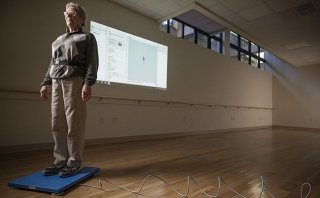Study Shows Breakthrough COVID Was Rare Among Vaccinated Seniors
Compared to pre-vaccination cohorts, and despite variants, fewer than 10% of vaccinated nursing home residents reported breakthrough COVID
-

Senior Scientist
BOSTON – A new study published in the Journal of American Medical Directors (JAMDA) found that the risk of severe COVID-19 illness among nursing home residents with complete vaccination are low. The study found that residents aged 85 and older with certain comorbidities like heart disease and kidney disease were more vulnerable but that the risk of breakthrough COVID among fully vaccinated residents was less than 10%.
Examining data of 23,172 fully vaccinated residents from 984 nursing homes from March through November 2021, the study, entitled “Resident Factors Associated with Breakthrough SARS-COV-2 Infections,” found that just 5% developed an incident of breakthrough infection (BTI) of COVID-19 irrespective of variant during the time frame.
The study also found that less than 10% of vaccinated residents with a breakthrough infection required hospitalization or died within 30 days (8.6%). Residents with severe infection were more likely to be aged 85 years and older and to have certain comorbidities, like heart disease and kidney disease.
“The goal of the study was to examine how often breakthrough infections and severe illness occur among nursing home residents who have received the COVID-19 vaccination series,” said the study’s co-author, Sarah D. Berry, M.D., M.P.H., Associate Director, Musculoskeletal Research Center and Associate Scientist, Hinda and Arthur Marcus Institute for Aging Research at Hebrew SeniorLife.
“Despite changes in the COVID-19 virus, the risk of severe infection in vaccinated older adults in nursing homes is low. Given that the pandemic continues and testing policies have relaxed, this data provides prognostic information for nursing home facilities faced with continued outbreaks,” Dr. Berry added.
The study’s findings are significant, Dr. Berry said, because “rates of BTI and serious illness may vary with other variants, but risk factors for serious illness are likely similar and may help providers predict who will get sick during future outbreaks.”
Brown University, NYU, and the University of Michigan collaborated in this retrospective cohort study.
Ana Montoya, M.D., M.P.H., C.M.D., Clinical Assistant Professor, Geriatric and Palliative Medicine, Medical Director, Sub-Acute Service and Medical Director, Glacier Hills Care and Rehabilitation Center, University of Michigan School of Medicine, was the first author of the study. Other authors included: Vincent Mor, Ph.D., Professor of Health Services, Policy & Practice and the Florence Pirce Grant University Professor, Brown University School of Public Health; Elizabeth (Betsy) White, A.P.R.N., Ph.D., Assistant Professor of Health Services, Policy, and Practice, Brown University School of Public Health; and Jasmine L. Travers, A.G.P.C.N.P.-B.C., C.C.R.N., Ph.D. R.N., Assistant Professor of Nursing, NYU Rory Meyers College of Nursing.
Funding came from grants from NIA/NIH (3U54 AG063546).
About the Hinda and Arthur Marcus Institute for Aging Research
Scientists at the Marcus Institute seek to transform the human experience of aging by conducting research that will ensure a life of health, dignity, and productivity into advanced age. The Marcus Institute carries out rigorous studies that discover the mechanisms of age-related disease and disability; lead to the prevention, treatment, and cure of disease; advance the standard of care for older people; and inform public decision-making.
About Hebrew SeniorLife
Hebrew SeniorLife, an affiliate of Harvard Medical School, was founded in 1903 and today is a national leader dedicated to empowering seniors to live their best lives. Hebrew SeniorLife cares for more than 3,000 seniors a day across six campuses throughout Greater Boston. Locations include: Hebrew Rehabilitation Center-Boston and Hebrew Rehabilitation Center-NewBridge in Dedham; NewBridge on the Charles, Dedham; Orchard Cove, Canton; Simon C. Fireman Community, Randolph; Center Communities of Brookline; and Jack Satter House, Revere. Hebrew SeniorLife also trains more than 1,000 future health care professionals each year, and conducts influential research into aging at the Hinda and Arthur Marcus Institute for Aging Research, which has a robust research portfolio whose NIH funding in 2021 places it in the top 10% of NIH-funded institutions. For more information about Hebrew SeniorLife, visit our website or follow us on our blog, Facebook, Instagram, Twitter, and LinkedIn.


